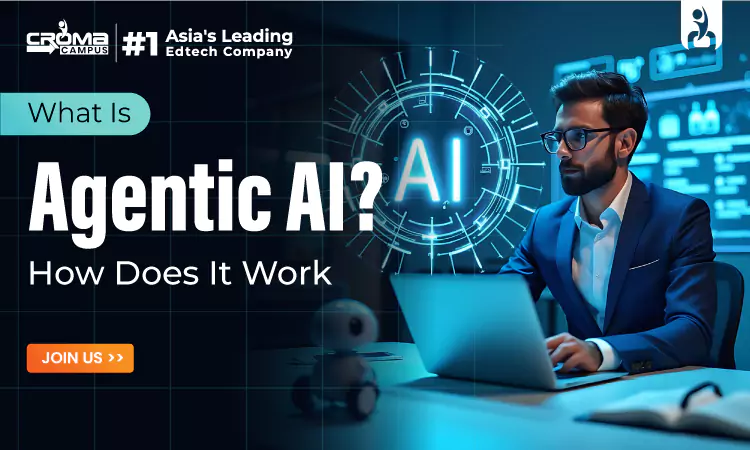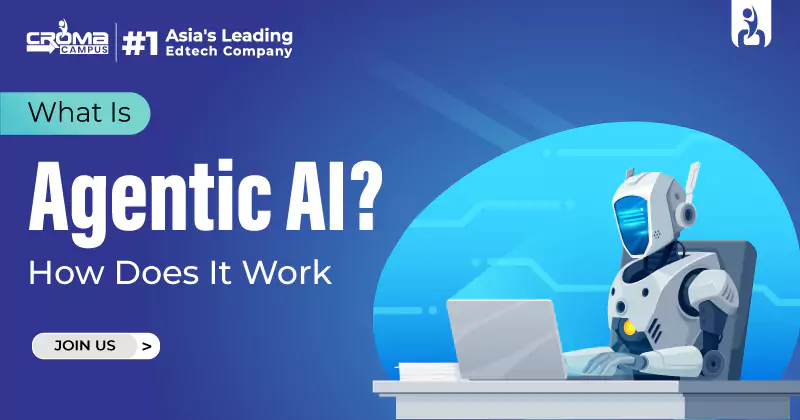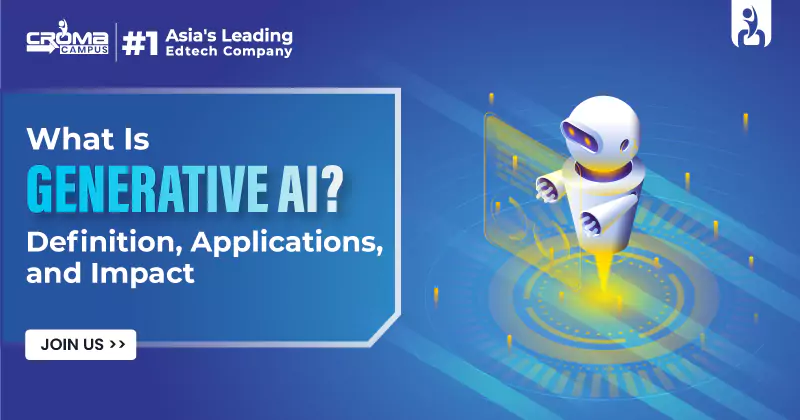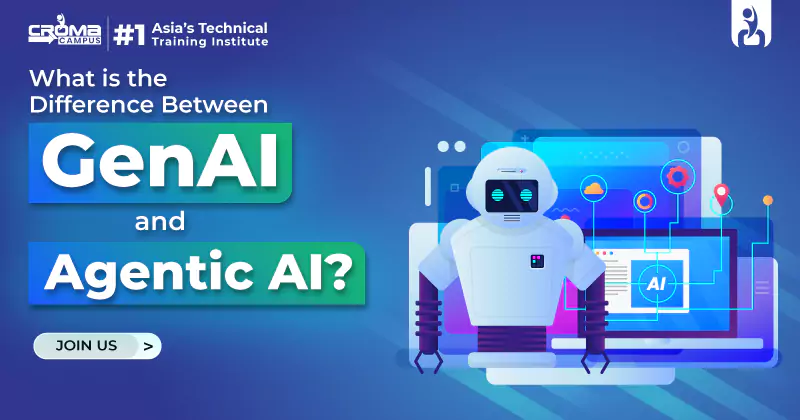What Is Agentic AI? How Does It Work
4.8 out of 5 based on 15341 votesLast updated on 2nd Aug 2025 20.5K Views
- Bookmark

Agentic AI is characterized by its key features, which enable autonomous and adaptive functionality.

There are two types of AI, which are Agentic AI and Generative AI. Agentic AI refers to artificial intelligence systems that can think, decide, and act independently to achieve specific goals without constant human input. These systems operate with autonomy, proactiveness, and goal orientation, making them distinct from traditional AI models. Generative AI is a closely allied activity and involves the generation of new content, in the form of text, images, or music, on the basis of learned patterns and structures formed by data.
Whereas the agentic AI is trained to work toward some goals and respond to environments, generative AI is the most efficient in dealing with creative and innovative outcomes. Agentic and generative AI together can bring new ways of solving problems, like AI-made content that can be customized to the liking of the user or AI art that changes with time. With AI evolving ever more in the coming years, there is so much potential in combination with agentic and generative AI to change the landscape of industries and renew opportunities. There is a huge demand for Generative AI Online Course, and enrolling in them can help you start a career in this domain.
Key Features of Agentic AI:
Agentic AI is characterized by its key features, which enable autonomous and adaptive functionality. With autonomy, it acts independently within set parameters, pursuing specific goals with precision. Its adaptability allows it to respond to changing environments and learn from past interactions. Seamless interoperability further enhances its capabilities. To learn more, one can visit the Agentic AI Course. Here are the key features of Agentic AI.
- Autonomy: Acts independently within a defined environment
- Goal-Orientation: Pursues predefined objectives or outcomes
- Adaptability: Responds to changing environments and learns from past interactions
- Interoperability: Engages with multiple systems, tools, and external APIs
How Agentic AI Works?
The functionality of the agentic AI can be defined as an intricate process in which autonomous decision-making and action are possible. It senses what is within its surroundings, data analyses, and performs tasks to accomplish certain objectives. Through such actions and the resultant learning, agentic AI becomes better equipped to handle tasks through iterative improvement. It is a process of efficiency and innovation. A lot of institutes offer Python with AI Course, and enrolling in them can assist you in jumping into the career field of field.
- Perception: Gathers the information in its surroundings by use of sensors, APIs, databases or user interactions.
- Inductive Reasoning: Interprets information, identifies trends, makes interpretations, and decides on the future steps with the help of Large Language Models (LLMs).
- Planning: Separates large goals into mini achievable actions, orders them, and then attaches them to the right AI agents.
- Implementation: Performs duties sequentially or concurrently, by communicating with an external system, or responding to a user.
- Learning and Adaptation: Analyzes and determines improvements based on the result, and collects feedback, and can build on the learning by using reinforcement learning or self-supervised learning.
Benefits of Agentic AI:
Integration of agentic AI, like no other industry, brings about its own transformation in terms of efficiency, personalization and flexibility. It improves decision-making and customer experiences through automation of complex workflows and analysis of large data. By learning and adopting, agentic AI changes the business operations, creating innovations and placing the business on the path of growth. It opens up new potentialities.
- Greater efficiency: Automation of otherwise manual and complicated workflows, resulting in more efficient working.
- Improved Customer Experience: Offers individual service and solves problems independently.
- Better Decision-Making: Retrieves facts, identifies trends, and reaches appropriate judgments.
- Flexibility: It changes according to new environments and learns from previous episodes.
Challenges and Limitations:
There are issues of agentic AI that need to be overcome to be successfully adopted. It is important to pay close attention to avoid undesired consequences, whereas the possibility of unpredictable behavior in complex environments is of concern. Besides, it is not simple to understand the decision-making process of agentic AI because of its complexity.
- Precision Oversight: Has to be watched carefully to ensure it does not happen by accident.
- Risk of High: Can be erratic in complicated or rapidly changing situations.
- Explainability: It can be hard to explain why agentic AI is coming to such decisions.
Also Read These Blogs:
GenAI Tools Changing Digital Marketing
Techniques Used In Generative AI
Difference Between GenAI And Agentic AI
Use Cases of Agentic AI:
Agentic AI is revolutionizing many industries with its ability to make decisions freely. Agentic AI is making customer support and sales and marketing, healthcare, finance, and logistics more efficient and streamlined. These are some of the major use cases:
- Automated Customer Service: AI virtual assistants are available 24 hours a day to answer inquiries, solve visitor problems and hand over complicated cases to human receptionists.
- FAQ Generation: AI agents apply machine and deep learning techniques to auto-generate and update frequently asked questions using the live customer interactions and a history of tickets.
- Customer Ticket Resolution: AI agents provide context-best responses or guide them to context-related resources.
- Lead Activation: AI-powered leads survey signals, tie outreach, and coordinate cross-channel multi-touch follow-ups.
- Sales Prospecting: AI agents will find high potential leads, do qualification interviews, and automatically score candidates.
- Marketing Campaign Orchestration: it runs campaigns in real-time, doing so in order to optimize intent, time, and ROI.
- Appointment Scheduling: The AI agents make bookings, reminders, and updating schedules.
- Clinical Decision Support: AI players advise clinical plans because of the data patterns of the patients.
- Digital Onboarding and Patient Intake: With the help of AI agents, the process of patient onboarding and classification is facilitated.
- Smart Portfolio Management: Portfolios are controlled by AI agents as per the calculated risk profiles by the user.
- Real-time Fraud Detection: AI-based agents identify and stop fraud attempts.
- Loan Application Processing: Documents are analyzed by the AI agents, risk is evaluated, and the loan is approved.
- Automated Order Fulfillment: AI agents make sure that all orders are delivered in time, and that customer satisfaction is increased.
- Inventory Management: AI agents will track inventory and predict demand and optimizations of the supply chain.
- Recruitment Automation: Candidates, resumes and setting up interviews are done using agents of AI.
- Employee Experience: AI agents collect sentiment, sound the alarm on engagement risks, and make insights available to HR leaders.
Conclusion
The agentic AI is a crucial step towards the development of artificial intelligence, as systems will be able to think, make decisions and autonomously take actions. And with its independence, its flexibility and its purpose-driven nature, it changes industries and taps new, opened possibilities. But thorough consideration and openness are essential to realize its facilities. The most important thing is to strike a balance between innovation and responsibility.
Subscribe For Free Demo
Free Demo for Corporate & Online Trainings.
















.webp)
.webp)

.png)















